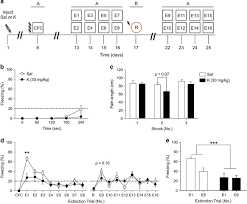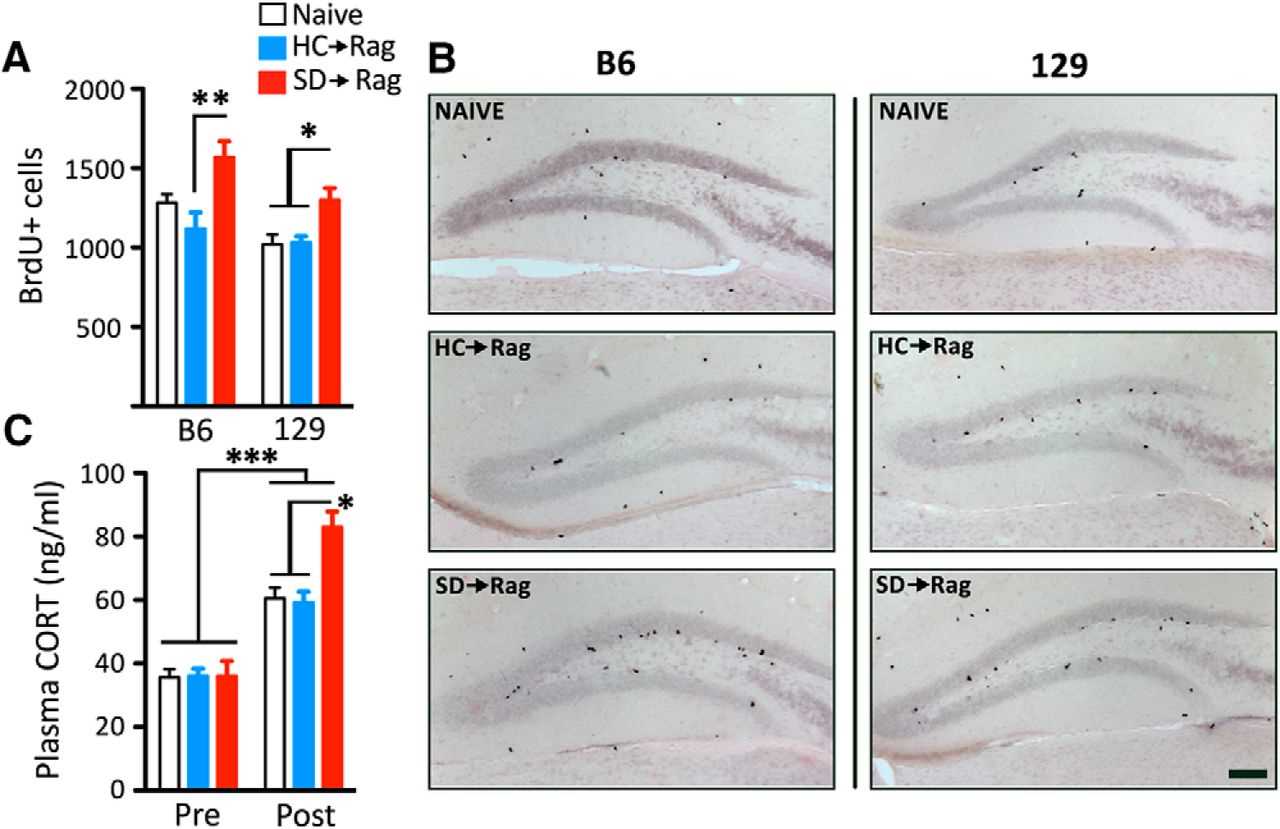
In today’s fast-paced and demanding world, stress has become a common occurrence for many individuals. The pressure to perform, the constant bombardment of information, and the expectations placed upon us can all take a toll on our mental well-being. But what if there was a way to build resilience to stress?
Rebecca Brachman, a neuroscientist and researcher in the field of psychology, has dedicated her career to studying stress resilience. Through her groundbreaking research, she has uncovered valuable insights into the mechanisms behind mental strength and how it can be cultivated.
Brachman’s work focuses on the intersection of neuroscience and psychology, exploring the intricate connections between the brain and behavior. By delving into the underlying biological processes that contribute to stress resilience, she has been able to identify potential strategies for building mental strength.
One of the key findings from Brachman’s research is the importance of proactive measures in combating stress. Rather than waiting for stress to take its toll, she advocates for taking preemptive action to strengthen our mental resilience. By implementing certain practices and habits, such as mindfulness exercises and self-care routines, we can build a solid foundation of mental strength that can withstand the challenges of life.
Understanding the Importance of Stress Resilience

Resilience is a crucial factor in maintaining good health, particularly when it comes to mental well-being. Stress is an inevitable part of life, and being able to effectively cope with and bounce back from stressful situations is essential for overall well-being.
Research in the field of neuroscience, led by experts like Rebecca Brachman, has shown that building stress resilience can have significant benefits for mental health. By understanding the mechanisms behind resilience, we can learn to better protect ourselves from the negative effects of stress.
Stress resilience refers to an individual’s ability to adapt and recover from stress. It involves a combination of psychological and physiological factors that work together to help individuals maintain equilibrium in the face of adversity.
Studies have shown that individuals with higher levels of stress resilience are better equipped to handle life’s challenges. They have a lower risk of developing mental health disorders such as anxiety and depression, and they generally experience better overall well-being.
Rebecca Brachman, a researcher in the field of stress resilience, has dedicated her work to understanding the biological mechanisms behind resilience and developing interventions to enhance it. Through her research, she has found that stress resilience is not a fixed trait but can be cultivated and strengthened.
By identifying the specific brain circuits and molecular pathways involved in stress resilience, researchers like Brachman are uncovering potential targets for interventions that can enhance resilience. This knowledge can lead to the development of new treatments and strategies to help individuals build mental strength and better manage stress.
Understanding the importance of stress resilience is crucial for individuals looking to protect their mental health and overall well-being. By actively working on building resilience, individuals can develop the tools and strategies necessary to navigate life’s challenges and maintain optimal mental health.
The Impact of Stress on Mental Health

Stress has a profound impact on mental health, as evidenced by extensive research in the fields of neuroscience and psychology. Rebecca Brachman, a renowned expert in stress resilience, has dedicated her career to understanding the effects of stress on the mind and developing strategies to build mental strength.
Stress is a natural response to challenging situations, but when it becomes chronic or overwhelming, it can have detrimental effects on mental health. The constant activation of the body’s stress response system can lead to an increased risk of developing mental illnesses such as anxiety and depression.
Research has shown that chronic stress can disrupt the brain’s neurochemistry, affecting the production and regulation of key neurotransmitters involved in mood regulation. This imbalance can contribute to the development of mental health disorders and make it more difficult to recover from them.
Furthermore, stress can impact cognitive function and impair decision-making abilities, memory, and attention. It can also weaken the immune system, making individuals more susceptible to physical illnesses that can further exacerbate mental health issues.
Rebecca Brachman’s work on stress resilience emphasizes the importance of developing strategies to build mental strength and protect against the negative impact of stress. By implementing practices such as mindfulness, exercise, and social support, individuals can enhance their resilience to stress and improve their overall mental well-being.
In conclusion, stress has a profound impact on mental health, and understanding its effects is crucial for promoting resilience and well-being. Through research and the development of strategies like those advocated by Rebecca Brachman, individuals can build mental strength and protect their mental health in the face of stress.
The Benefits of Stress Resilience

Stress resilience, as explained by neuroscientist Rebecca Brachman, is the ability to bounce back from stressful situations and maintain mental strength. Research in neuroscience has shown that stress resilience plays a crucial role in maintaining overall mental health.
Rebecca Brachman’s research has found that individuals with high levels of stress resilience are better equipped to handle life’s challenges and are less likely to develop mental health disorders such as anxiety and depression. This is because stress resilience helps to regulate the body’s stress response system, preventing it from becoming overactive and leading to chronic stress.
Furthermore, stress resilience has been linked to improved cognitive function and better decision-making abilities. When individuals are able to effectively manage stress, they are better able to focus their attention and make rational decisions, even in high-pressure situations.
Additionally, stress resilience has been shown to have a positive impact on physical health. Chronic stress has been linked to a range of health problems, including cardiovascular disease, obesity, and weakened immune function. By building stress resilience, individuals can reduce their risk of developing these health issues and improve their overall well-being.
In conclusion, stress resilience, as researched by Rebecca Brachman, has numerous benefits for mental and physical health. By developing stress resilience, individuals can better handle stress, maintain mental strength, and improve their overall well-being.
Strategies to Build Mental Strength

To build mental strength and resilience, it is important to understand the research and findings in the field of psychology and neuroscience. Rebecca Brachman, a leading researcher in stress resilience, has conducted extensive studies on the topic. Her work has shed light on effective strategies to build mental strength.
One strategy is to develop a positive mindset. Research has shown that individuals who have an optimistic outlook are better equipped to handle stress and adversity. By focusing on the positive aspects of a situation, individuals can reframe their thoughts and build resilience.
Another strategy is to practice self-care. Taking care of one’s physical and mental well-being is crucial for building mental strength. This can include engaging in regular exercise, getting enough sleep, and practicing relaxation techniques such as meditation or deep breathing exercises.
Building a strong support network is also important. Having a network of family, friends, or colleagues who can provide emotional support and guidance can help individuals navigate stressful situations. This support system can provide a sense of belonging and help individuals feel more resilient.
Additionally, developing effective coping mechanisms is essential for building mental strength. This can include engaging in hobbies or activities that bring joy and relaxation, seeking professional help when needed, and practicing problem-solving skills to address challenges effectively.
In conclusion, building mental strength and resilience requires a combination of strategies. By understanding the research and insights from experts like Rebecca Brachman, individuals can develop effective techniques to navigate stress and build mental strength.
Rebecca Brachman’s Approach to Stress Resilience

Rebecca Brachman is a neuroscientist and psychologist who specializes in researching mental health and resilience. Her work focuses on understanding how the brain responds to stress and developing strategies to build resilience.
Through her research, Brachman has found that stress can have a profound impact on both mental and physical health. Chronic stress has been linked to a variety of health problems, including depression, anxiety, and cardiovascular disease. In order to combat these negative effects, Brachman believes it is important to develop resilience.
Resilience refers to an individual’s ability to bounce back from adversity and maintain mental well-being. Brachman’s approach to building resilience involves a combination of neuroscience and psychology. She believes that by understanding the underlying mechanisms of stress and resilience, we can develop effective strategies to strengthen our mental health.
Brachman’s research has shown that there are certain factors that contribute to resilience. These include social support, positive emotions, and a sense of purpose. By fostering these factors in our lives, we can increase our resilience and better cope with stress.
One of the key findings of Brachman’s research is the importance of early intervention. She has found that by identifying individuals who are at risk for developing mental health problems and providing them with support and resources, we can prevent the negative effects of stress from taking hold.
Overall, Rebecca Brachman’s approach to stress resilience combines the fields of neuroscience, psychology, and research. By understanding the underlying mechanisms of stress and resilience, she aims to develop effective strategies to build mental strength and improve overall well-being.
Brachman’s Research on Stress Resilience

Rebecca Brachman is a renowned psychologist who has dedicated her research to understanding stress resilience and its impact on mental health. Her groundbreaking work has shed light on the factors that contribute to an individual’s ability to cope with and overcome stress.
Through her research, Brachman has found that resilience is not solely determined by genetics or personality traits, but can be cultivated and strengthened through various strategies and interventions. She has conducted numerous studies that have shown the effectiveness of certain techniques in building mental strength and enhancing stress resilience.
One of the key findings of Brachman’s research is the importance of social support in promoting resilience. She has found that individuals who have a strong network of supportive relationships tend to be more resilient in the face of stress. This is because social support provides emotional and practical assistance, which helps individuals better cope with and recover from stressful situations.
Another area of Brachman’s research focuses on the role of positive emotions in resilience. She has found that individuals who are able to maintain a positive outlook and experience positive emotions, such as gratitude and joy, are more likely to bounce back from stressful events. This is because positive emotions help to counteract the negative effects of stress and promote psychological well-being.
Brachman’s research also emphasizes the importance of self-care in building resilience. She has found that individuals who prioritize their physical and mental health are better equipped to handle stress. This includes engaging in regular exercise, getting enough sleep, practicing relaxation techniques, and seeking professional help when needed.
In summary, Brachman’s research on stress resilience has provided valuable insights into the psychology of resilience and its impact on mental health. Her findings highlight the importance of social support, positive emotions, and self-care in building mental strength and effectively managing stress. By implementing these strategies, individuals can improve their resilience and enhance their overall well-being.
The Role of Neurobiology in Building Resilience

Resilience, the ability to bounce back from stress and adversity, is a key component of mental health and well-being. Understanding the neurobiological mechanisms that underlie resilience can provide valuable insights into how to build and strengthen this important trait.
In her research, Rebecca Brachman explores the intersection of psychology, neuroscience, and mental health to uncover the biological factors that contribute to resilience. By studying the brain and its response to stress, Brachman aims to develop new strategies for enhancing mental strength and promoting resilience.
One area of focus in Brachman’s work is the role of neurotransmitters, the chemical messengers in the brain, in resilience. Research suggests that certain neurotransmitters, such as serotonin and dopamine, play a crucial role in regulating mood and stress response. Understanding how these neurotransmitters function and interact with other brain systems can provide insights into how to enhance resilience.
Another important aspect of neurobiology in building resilience is the study of neural plasticity. The brain has the remarkable ability to change and adapt in response to experiences and environmental factors. By understanding how the brain can rewire itself, researchers can develop interventions and techniques that promote resilience and help individuals recover from stress and trauma.
Moreover, Brachman’s research also explores the impact of genetics on resilience. Certain genes and genetic variations have been linked to resilience, suggesting a biological basis for this trait. By identifying these genetic factors, researchers can gain a better understanding of the mechanisms that contribute to resilience and develop targeted interventions for individuals who may be more susceptible to stress.
Overall, the field of neuroscience offers valuable insights into the biological basis of resilience. By understanding the neurobiological mechanisms involved, researchers like Rebecca Brachman can develop strategies and interventions that promote mental health and well-being. By building resilience, individuals can better cope with stress and adversity, leading to improved overall health and quality of life.

I am Patrina de Silva, a psychologist and mental health blogger in Sri Lanka. After obtaining psychology degrees from the University of Colombo and Monash University, I returned home to work as a counselor while also starting the popular blog “Pressy but Happy” to provide advice on psychological issues. Over the past decade, my empathetic articles have made my blog a leading mental health resource in the country. In addition to writing, I maintain a private therapy practice, frequently volunteer counseling time, and conduct seminars, driven by my passion for destigmatizing mental illness and educating the public on the mind-body connection. I strive to be an influential voice in my field through my compassionate approach.
